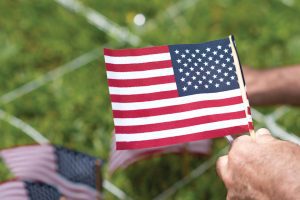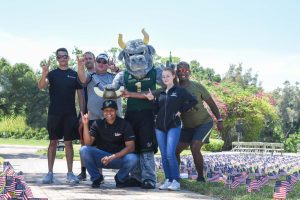Research Roundups
A Snapshot of Faculty Research
Rick Borghesi, PhD
When Associate Professor of Finance Rick Borghesi, PhD, fused two of his passions – sports and finance – as research topics, he tapped into a national debate about collegiate athletes and whether they should be paid like their professional counterparts.
“There is a long-standing agreement between the National Collegiate Athletic Association (NCAA) affiliated universities and student-athletes in which players exchange limited athletic services for scholarships in lieu of cash wages,” Borghesi wrote in the introduction to “Pay for Play: The Financial Value of NCAA Football Players,” published in Applied Economics earlier this year. “To many this seems unfair since universities earn billions of dollars from football operations.”
SUBSCRIBE TO
Research: USF Sarasota-Manatee Campus
Subscribe to our digital Research Magazine and full access to online content and e-Alerts
Borghesi said the impetus for this and another study, “The Financial and Competitive Value of NCAA Basketball Recruits,” (Journal of Sports Economics, 2017) was the disparity between the financial windfall reaped by universities and the NCAA and the often poor and overburdened student-athletes.
“I think paying student athletes fair wages is an inevitability,” said Borghesi. “As broadcast rights contracts continue to increase in value there will be mounting societal pressure to share the wealth with those responsible for generating it – primarily the student-athletes.”
This could also be a big year for Borghesi’s earlier research projects exploring the existence of profitable sports betting strategies, as more than a dozen states are expected to introduce bills legalizing sports gambling.
Borghesi is returning to his finance roots for his next project – a joint study with Finance Associate Professor Kiyoung Chang exploring the benefits that corporations obtain by engaging in socially responsible activities such as environmental and human rights initiatives.
James Unnever, PhD
Asking the tough questions and insisting on change when it comes to racism and crime in America is something criminology professor James Unnever, PhD, admits can be challenging, but necessary.
“I’ve always been an advocate for social justice,” said the USF Sarasota-Manatee criminology professor. “Racism is like a surgeon’s scalpel for exposing the fundamental nature of our country’s society.”
Utilizing case studies, interviews, secondary and longitudinal data, public records and 40 years of criminology and race relations research, Unnever’s latest work has culminated in his third book, “Building a Black Criminology: Race, Theory, and Crime,” scheduled to be published this year.
A follow-up to his 2011 book, “A Theory of African American Offending: Race, Racism, and Crime,” the new book advances the thesis that the field needs to incorporate the experiences of what it means to be black living in a racist society into its analyses of crime.
“This is the only way to fully understand why blacks commit crimes and to generate race-specific policies that will mitigate the likelihood that a black person will commit crimes,” Unnever said.
“The field of criminology has essentially assumed the causes for black and white crime are the same, but it’s not true,” he said. “Research shows that chronic exposure to white racism – feeling disrespected, stereotyped negatively, encountering discrimination in schools, stores, jobs – increases the likelihood that blacks will become hostile and angry. They have experienced racism at a level unparalleled to other minority groups in American history.”
Joy D’Andrea, PhD
For USF Sarasota-Manatee mathematics and statistics instructor Joy D’Andrea, PhD, it would be expected that her research résumé would include topics such as applied statistics, extreme value theory and mathematical crystallography.
But the Philadelphia native, who has lived in the Sunshine State for more than 25 years, most recently applied her numbers expertise to explore something closer to home – hurricanes.
“Part of my family is from the Florida Keys, and I have been through many hurricanes, including Hurricane Andrew,” said D’Andrea. “This inspired me to investigate and help forecast hurricanes.”
In her current work, “A Statistical Analysis of Hurricanes in the Atlantic Basin and Sinkholes in Florida,” D’Andrea seeks to understand and more accurately predict the formation of a storm and how that is connected to sinkhole creation.
Armed with buoy data in the region, along with hurricane data for the years 1992 through 2014 from Unisys Weather, she analyzed the probability of storms. She used a process called exploratory factor analysis (EFA) to determine storm factors that explain variance and to measure correlations between storm indicators such as month, location, wind speed and barometric pressure.
With information from the Florida Department of Environmental Protection, she conducted statistical analysis on the four types of sinkholes in Florida – collapse, solution, alluvial and raveling – to determine time to event between occurrences of sinkholes.
As she works toward a conclusion to this project, D’Andrea continues to incorporate personal and professional expertise with proposals for future research on instructional design, sea turtles and coral reefs.



